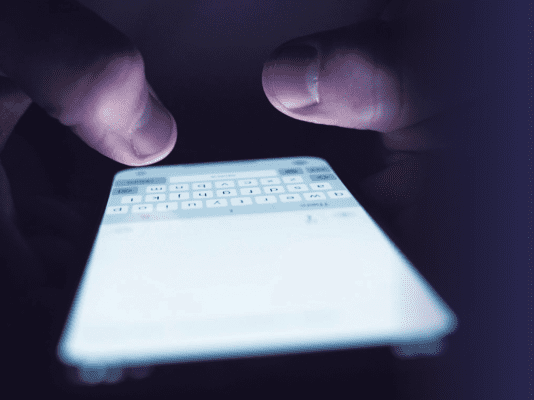Every new communication technology is disruptive, often in history-altering ways. Nearly 600 years ago, Gutenberg’s printing press ushered in a revolution in education, politics, and religion, including fanning the flames of the Protestant Reformation. Just 11 years ago, Steve Jobs’ iPhone ushered in a similar revolution, one we are only beginning to grasp.
Will the smartphone still be around in 600 years? I doubt it, but no one knows for sure. What we do know is that in its first decade of existence, the smartphone is already changing how we view communication. What are those changes? Are they good or bad for society? These are important questions to ask of any new technology, and I consider them in light of one particular aspect of the smartphone era: the phenomenon of “push notifications.”
The consequences of efficiency
It used to be a thing of joy to receive a letter in the mailbox. In the early days of the internet, "you've got mail" was a happy notification. These days, I find most forms of “push notifications” to be anxiety-producing. Why? Because they signal a tidal wave of nonstop communication that is relentless and punishing.
How does one stay sane in a world where on any given day, people message you through email (multiple accounts), Twitter, Facebook, Instagram, LinkedIn, SnapChat, Voxer, WhatsApp, Slack, Skype, Google chat, and texts (to name a few)? All these forms of communication are efficient. But what are the unintended consequences of that efficiency?
Here are two points we should consider:
1. Chronic catch-up
Because inboxes are never empty and notifications on a plethora of platforms pop up around the clock, I find myself in a constant state of catch-up. I try to make headway on my email inbox, but then there are Facebook messages and Tweets I need to reply to. There are Voxer messages from my fellow elders at church about urgent pastoral situations. Various coworkers need my insights on Slack, and my wife is messaging me over chat.
All of it feels urgent, demanding timely replies. And the cumulative effect is that it reduces would-be meaningful interactions to mere checklist to-dos: “Text ___ back.” “Respond to ___’s email.” “Post ____ article on Twitter.”
But in this frenetic flurry of catch-up, the “communing” sacredness of communication can be lost. We are often too bombarded and harried to make space for considered, attentive, meaningful communication. The smartphone has always been touted as a tool of efficiency, and so naturally this is how we use it. But what if communication is degraded when it becomes too efficient? A tweet or a text in response to someone may be quick and easy, but is that always the wisest way to respond?
Christians, especially, should be mindful of how the efficient view of communication changes how we relate to people. Are we treating them with dignity, giving them our attention and presence? Or do we demean and cheapen them through our quick-draw posture?
When we are spread so thin, across dozens of communication platforms and with hundreds of “friends” and “connections,” the need to “update” the masses can trump the nobler desire to connect with a few people more personally and profoundly. In our hectic, breathless days, we may be tempted to send a quick text or email to someone who actually deserves a more substantive and careful response.
2. When everything is important, nothing is
There is an “everything is urgent and important” quality to the smartphone and its ambience of buzz/ding/beep push notifications. Whether it’s a text message that ends in the ubiquitous words “let me know,” a BREAKING NEWS alert, or something #trending that you simply can’t not know about, the smartphone constantly reminds us of things to do and know about, and people to communicate with. At least five times every day I see social media declarations that something is a “must-read,” “must-watch,” or “must-listen.” The glut of “essential” content means our must list gets longer and longer, adding to our already lengthy queue of communication to-dos.
This is part of why we can’t put our smartphones down, checking them hundreds of times per day. What are we missing? We don’t want to be out of the loop. Plus, there is an undeniable thrill to seeing new notifications. Psychologists have noted the way smartphone notifications trigger a dopamine rush that becomes addictive. As psychologist David Greenfield recently told NPR, “Smartphone notifications have turned us all into Pavlov’s dogs.”
One of the (many) side effects of notification addiction is that we lose a sense for what is actually important and urgent. Do we really need to read every “news” story that comes across our phones? The leveling aspect of information that comes to us on our smartphones—sports scores next to CaringBridge cancer updates next to theological debates about gender roles next to videos of your aunt’s cat—can have a numbing, trivializing effect. Neil Postman noted this, presciently, in his 1985 book Amusing Ourselves to Death, in which he talked about the “Now. . . this” nature of televised news:
"Now, this. . ." is commonly used on radio and television newscasts to indicate that what one has just heard or seen has no relevance to what one is about to hear or see, or possibly to anything one is ever likely to hear or see. The phrase is a means of acknowledging the fact that the world as mapped by the speeded-up electronic media has no order or meaning and is not to be taken seriously.
Because the smartphone tends to perpetuate an exaggerated sense of the importance and urgency of everything, we can naturally get sucked into its orbit, to the point that we neglect the truly important and urgent matters in our own lives, families, and communities. Indeed, one of the great perils of the smartphone is its capacity for destructive distraction: drawing our attention in a thousand different directions when our priority should be on the proximate people and local problems in front of us.
The smartphone’s push notifications can crowd out the more vital flags and warning lights in our lives that should grab our attention. Are you spending quality time with your spouse and children? Do you read the Bible and pray in the morning, before you check your phone? When was the last time you invited someone over for dinner? Are you paying attention to your physical health? Have you had a substantive, in-person interaction with a close friend recently?
If your smartphone is crowding out these more-important “life notifications,” do something about it. Turn off your push notifications. Consider downgrading to a “dumb” phone that only does two or three things. Set things up so that the agenda for your time and attention is set by the life right in front of you—your home, church, workplace, community—rather than the smartphone maelstrom.
Read more articles on technology in the Summer 2018 issue of Light Magazine here.










